Text
I don't care if we never fuck again. I just want to watch her ascent and disintegration, because anything burning that bright one day must consume itself and float away, an ash, and no one has the power to stop it. It's flirting with disaster to love someone that much, someone who's always on the brink of going away. I know she doesn't need saving, but I dream of saving her, of rolling a rock up the mountain and being flattened by it as it rolls back over me all the way to the bottom again. And then I push it right back to the top, because if it takes this much sweat it must be worth it.
Obsessed with angels, she's divinely twisted. She builds neon-winged sculptures, and in black ink she scratches out demonic, sunken-eyed, jowly, pear-shaped angels that she thinks look like her, with bat-wing claws. She doesn't see what we see when she looks at herself.
godspeed, by lynn breedlove (2002)
23 notes
·
View notes
Text
Mom was almost never at home at the time. She was into her jellyfish phase, and she used to spend all day at the invertebrate tank in the city aquarium, where she would sit, clutching her old Gucci handbag, watching kurage (水母 — jellyfish; lit. "water" + "mother") through the glass. I know this because she took me there once. It was the only thing that relaxed her. She had read somewhere that watching kurage was beneficial to your health because it reduces stress levels, only the problem was that a lot of other housewives had read that same article, so it was always crowded in front of the tank, and the aquarium had to set out folding chairs, and you had to get there really early in order to get a good spot, all of which was very stressful. Now that I think about it, I'm pretty sure she was having a nervous breakdown at the time, but I remember how pale and beautiful she looked with her delicate profile against the watery blue tank, and her bloodshot eyes following the drift of the pink and yellow jellyfish as they floated by like pulsing pastel-colored moons, trailing their long tentacles behind them.
A Tale for the Time Being (2013) by Ruth Ozeki
17 notes
·
View notes
Text
This is what Felice meant about painting—in her mind, O'Keeffe's paintings of clouds were what clouds looked like—and when she looked out of the airplane and the clouds arranged themselves in ways that recalled the cloud paintings, she realized she had substituted the image for the experience in her mind. Nevertheless, the thing you couldn't put in a painting was still the air—the wind feathery against their bodies when they sat in Rebecca's garden looking at the morning glories or the stale air in an airplane cabin, full of coughs, sighs, and shallow breaths.
Rebecca's Garden by Elana Dykewomon in Moon Creek Road (2003)
2 notes
·
View notes
Text
Knaydle is round and wet but chewy. If the moon were butch, she'd be Knaydle—busy trying to define the horizon, self-important, patching together fog in order to hide her sentimentality but steady for all that, comforting as she moves across your sky.
Knaydle and the Librarian by Elana Dykewomon in Moon Creek Road (2003)
7 notes
·
View notes
Text
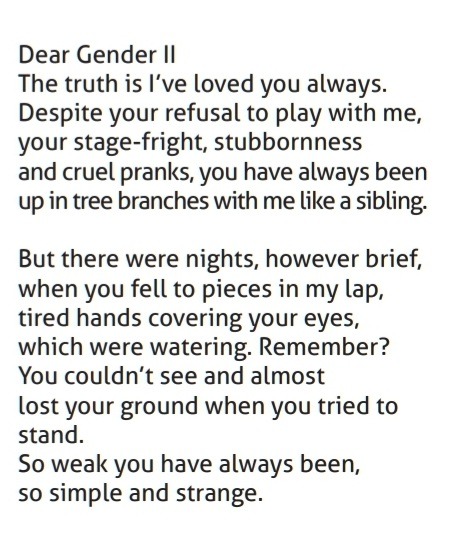
Dear Gender from Butch Geography (2013) by Stacey Waite
#the second poem titled dear gender in the collection#dear gender#stacey waite#butch geography#butch#butch lesbian#poem#poetry
1 note
·
View note
Text
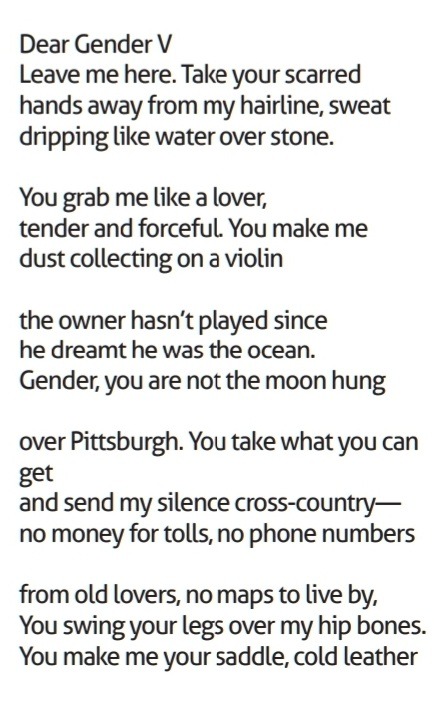

Dear Gender from Butch Geography (2013) by Stacey Waite
#the fifth poem titled dear gender in the collection#dear gender#stacey waite#butch geography#butch#butch lesbian#poem#poetry
8 notes
·
View notes
Text
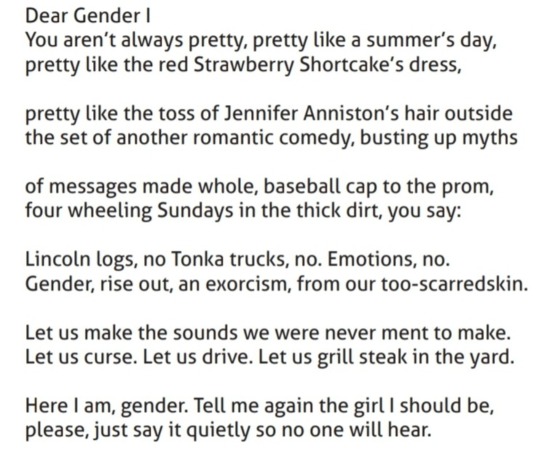
Dear Gender from Butch Geography (2013) by Stacey Waite
#the first poem title dear gender in the collection#dear gender#butch geography#stacey waite#butch lesbian#butch#poetry#poem
0 notes
Text
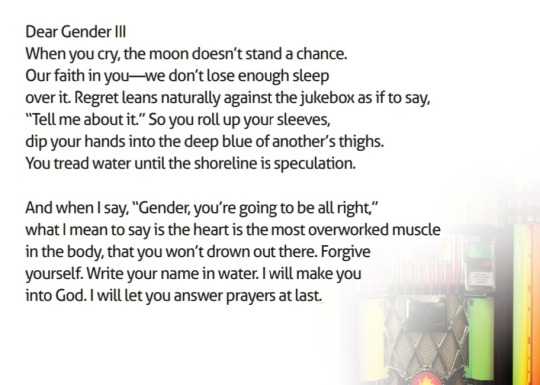
Dear Gender from Butch Geography (2013) by Stacey Waite
#the third poem titled dear gender in the collection.#dear gender#butch geography#stacey waite#butch#butch lesbian#poetry#poem
4 notes
·
View notes
Text
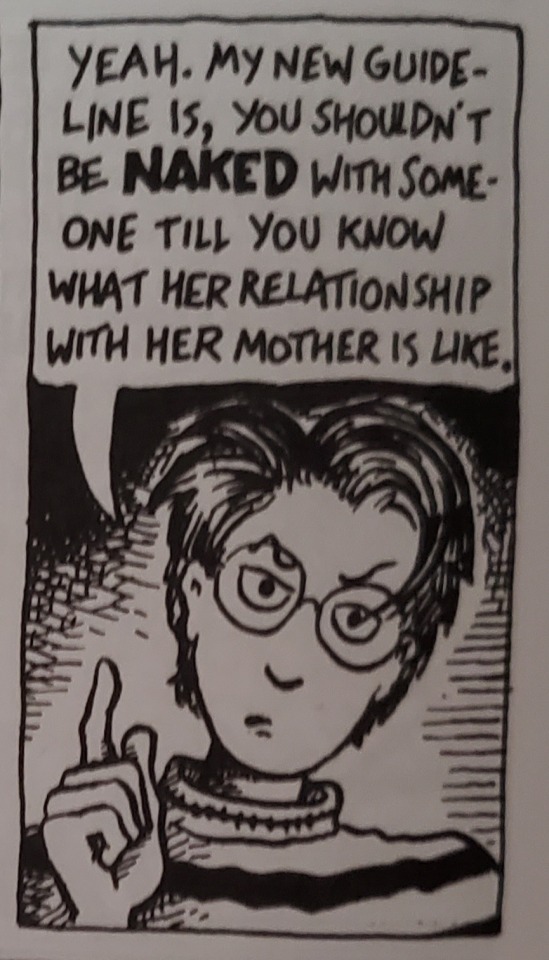
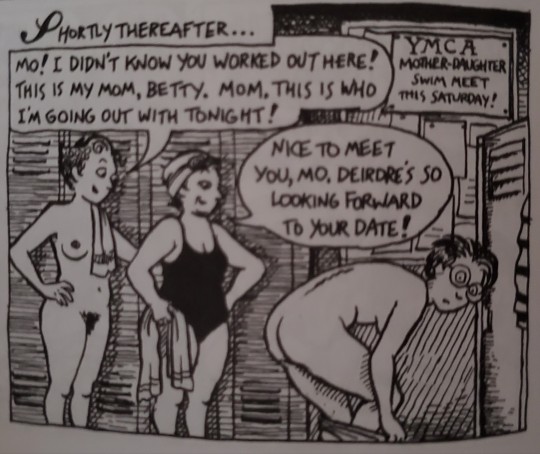
Dykes to Watch Out For (1994) by Alison Bechdel
118 notes
·
View notes
Text
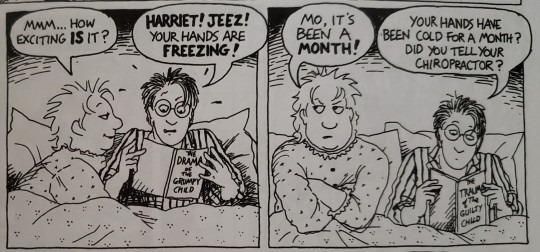
Dykes to Watch Out For #80 (1990) by Alison Bechdel
42 notes
·
View notes
Text
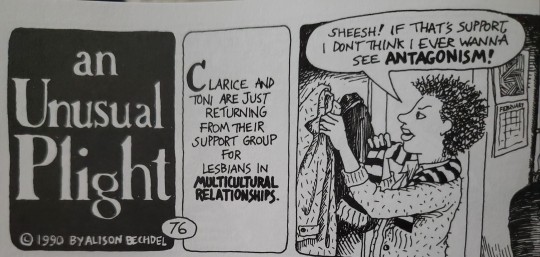
Dykes to Watch Out For #76 (1990) by Alison Bechdel
7 notes
·
View notes
Text
Now she's an ordinary forty-seven-year-old lesbian. She bleeds—on the day she bleeds the most, she is remote and inclined to change her daily habits. She drives through Oakland, bleeding in the heat, a week past solstice. She longs for her lover, and her longing is easily satisfied. She can interrupt her work and they'll have lunch for an hour. She can choose an unusual route and watch the houses waver in the heat then come into focus—each particular house, each separate life, a whole city, where she lives, an escaped mental patient, with only her little part of the common life. By now, no one would know to look for her.
"An Escaped Mental Patient" by Elana Dykewomon in Moon Creek Road (2003)
1 note
·
View note
Text
...the history of the family was a machine of unavoidable repetitions, a turning wheel that would have gone on spilling into eternity were it not for the progressive and irredeemable wearing of the axle.
100 Years of Solitude by Gabriel García Marquez (1967)
50 notes
·
View notes
Text
Before reaching the final line, however, he had already understood that he would never leave that room, for it was foreseen that the city of mirrors (or mirages) would be wiped out by the wind and exiled from the memory of men at the precise moment when Aureliano Babilonia would finish deciphering the parchments, and that everything written in them was unrepeatable since time immemorial and forever more, because races condemned to one hundred years of solitude did not have a second opportunity on earth.
100 Years of Solitude by Gabriel García Marquez (1967)
15 notes
·
View notes
Text
He really had been through death, but he had returned because he could not bear the solitude.
100 Years of Solitude by Gabriel García Marquez (1967)
18 notes
·
View notes
Text
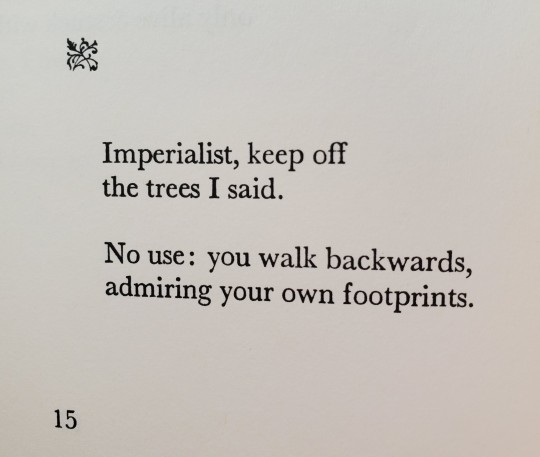
Power Politics by Margaret Atwood (1971)
35 notes
·
View notes
Text
And I saw then again, and for good, what I had always been afraid to see, and had pretended not to see in him: that he was a woman as well as a man. Any need to explain the sources of that fear vanished with the fear; what I was left with was, at last, acceptance of him as he was. Until then I had rejected him, refused him his own reality. He had been quite right to say that he, the only person on Gethen who trusted me, was the only Gethenian I distrusted. For he was the only one who had entirely accepted me as a human being: who had liked me personally and given me entire loyalty, and who had therefore demanded of me an equal degree of recognition, of acceptance. I had not been willing to give it. I had been afraid to give it. I had not wanted to give my trust, my friendship to a man who was a woman, a woman who was a man.
The Left Hand of Darkness by Ursula K. Le Guin (1969)
11 notes
·
View notes